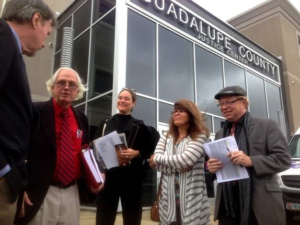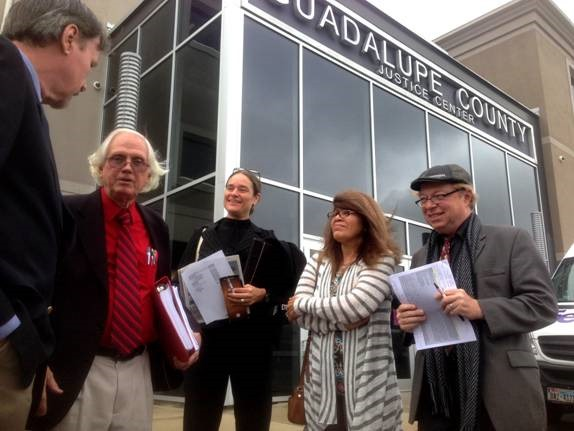In an Age of ‘Weaponized Media,’ Read All About Avery v. Baddour & Hearst Communications Inc.
SPRING 2016: Pictured below, from left, outside the Guadalupe County Justice Center in Seguin, Texas: Veryl Brown, a local Seguin attorney & friend of plaintiff; Ron Avery, the Pro Se Petitioner; Mary Krenek, citizen court watcher; and Angie and Mark Anderson (a.k.a. Truth Hound) representing American Free Press.

URGENT TRUTH HOUND NOTE: Mr. Ronald Avery (a Seguin, Texas architect) is fed up with “Weaponized Media” (the exact title of a soon-to-be-published book by Yours Truly, The Truth Hound). But rather than just sit back and bemoan the media, Avery—after experiencing malicious media malpractice firsthand—filed a lawsuit against the Hearst media empire and one of its reporters. The New York-based Hearst Corp., infamous ever since its early days when founder William Randolph Hearst beat the drums for the U.S. to enter the Spanish-American War on false pretenses, is still in the mega-hype business for stirring up readers with gripping headlines, regardless of the accuracy of the stories under those headlines.
BELOW IS AVERY’S OWN OVERVIEW OF HIS LAWSUIT, WRITTEN IN THE THIRD PERSON. EDITING WAS LIMITED TO GRAMMAR AND PUNCTUATION ADJUSTMENTS.
History of Court Activity:
Mr. Avery filed suit against Houston Chronicle News Reporter Dylan Baddour and Hearst Communications, Inc., owner of the Houston Chronicle, for libel.
These defendants wrote and published a web article and a front-page news article using words, other articles and photographs juxtaposed in such a way that tended to injure Avery’s reputation exposing him to public expressions of hatred, contempt and ridicule.
The articles falsely said that Avery was a member of the Republic of Texas, and was a secessionist, and implied that Avery was also a fascist, neo-Nazi and part of the growing right-wing terror threat in America that is now worse than Muslim terrorism. The web article produced 23 unsolicited comments in the blog under the web article in which nine expressed hatred, ridicule and contempt. None of the comments were complimentary.
The Defendants filed an “anti-SLAPP” Motion to Dismiss using the “Texas Citizen Participation Act” (Texas Civil Practice & Remedy Code Chapter 27). SLAPP is an acronym for “Strategic Lawsuit Against Public Participation.”
After a very brief hearing on the motion in trial court (15 minutes), the judge took the case under “advisement” but quickly (over the weekend) returned a ruling dismissing the lawsuit and denying the Defendant’s request for mandatory attorney fees, costs, expenses, and sanctions that would deter Avery from ever filing a similar lawsuit. The immediate question is, why would a judge who studied libel and the anti-SLAPP dismissal statute enough to grant dismissal, deny mandatory attorney fees, costs, expenses and sanctions? Avery is sure it is because the judge did not study the case at all and did not know that the same were mandatory under the TCPA or anti-SLAPP statute.
Avery filed an appeal to the Texas Fourth Court of Appeals and Defendants also filed an appeal of the denial of their mandatory fees, etc., and for sanctions. The Fourth Court of Appeals issued a 13-page Memorandum Opinion affirming the trial court’s dismissal of Avery’s suit but reversing and remanding the trial court’s denial of mandatory attorney fees, costs, expenses and sanctions.
On 9/26/16 Avery filed a Petition for Review in the Supreme Court of Texas requesting that he and the Respondents be asked to file a Brief on the Merits for consideration of four issues he brought, and that the Supreme Court of Texas Reverse the rulings of the Fourth Court of Appeals and remand the case for a trial on the merits.
Avery’s Four Issues:
- The “hypothetical average reasonable reader” doctrine of determining a publication’s capability to defame found “as a matter of law” by a judge alone cannot replace written evidence of the expression of public ridicule, contempt and hatred, the statutory definition of defamation, as it did in the Avery case.
- The “substantial truth” doctrine cannot alter the nature of things but only the minor degree of something. A publication that a person stole $200 when they only stole $150 is “substantially true” showing that the person was a petty thief. But it cannot make someone a member who was not a member, nor can it make a secessionists from one opposed to secession, as was done in the Avery case.
- The common law or case law definition of defamation should be brought into conformity with the statutory definition of defamation to prevent the TCPA from being a trap for those innocent of filing a SLAPP suit, as was the situation in the Avery case. Presently, no one can know if a judge will find that an article that defamed them was capable of doing so, which is an absurdity on its face. Avery provided evidence of actual written public defamation under the Libel Statute but the 4th Court of Appeals said the articles were incapable of producing defamation “as a matter of law.”
- The TCPA (CPRC Chapter 27) has an internal flaw that allows news reporters to violate their own professional ethics and implement the said Act which should not apply to them. Anyone can use the Act’s rapid dismissal procedures that short circuit the ordinary judicial process if they can show they were exercising their Constitutional Rights of Free Speech, Association or Petition. The Act defines the exercise of the constitutional right of free speech as any “communication made in connection with a matter of public concern (CPRC 27.001(3).”
Therefore, a news reporter, who is NOT permitted to participate or exercise his or her own constitutional rights when reporting on a public concern, becomes a participant who can then use the Act as a defense when they injure the reputation of those they report on who really were using their own constitutional rights of free speech, association and petition, as Avery was. All evidence shows it was Avery who was exercising his constitutional rights not Baddour and Hearst.
Erroneous Rulings of the Fourth Court:
Regarding the truth of the articles, the Fourth Court of Appeals in San Antonio found that Avery had not shown prima facie evidence of the element of falsity to maintain his libel lawsuit. Truth is a defense in a libel suit. If the publisher can show that what they published was true then there can be no libel. The Fourth Court of Appeals made the most amazing admission and finding in Avery’s case [as follows]:
Even if the captions incorrectly identified Avery as a secessionist, falsely implied Avery renounced his U.S. citizenship, incorrectly identified the Texians as secessionists, and falsely implied Avery was a member of a secessionist organization, the gist of the article is substantially true: the Republic of Texas is a volunteer, non-violent organization premised on the belief that Texas is a sovereign nation and whose goal it is to legally extricate itself from the United States. No reasonable reader would conclude—as argued by Avery—that either he or the Republic of Texas is a “far-right fascist, neo-Nazi, part of the growing right-wing terrorist threat.” The only evidence of such a conclusion is Avery’s own allegations. However, “[b]are, baseless opinions [are not]a sufficient substitute for the clear and specific evidence required to establish a prima facie case under the [Act].” In re Lipsky, 460 S.W.3d at 592.
Avery provided extensive evidence that he was not a member of the Republic of Texas and Baddour and Hearst agreed and attempted to correct the articles in that regard. But they did not attempt to correct that issue on the web article until six days after they had been sued by Avery. Avery supplied extensive evidence that he was opposed to secession and had been interviewed by national newspapers on the subject and done radio shows on it as well. Avery showed evidence that the Republic of Texas was also opposed to secession.
Baddour published the falsehood that the ROT was a secessionist organization and that Avery was a member of it. Then they used that false premise to stack other inapplicable attributes on them from other hyperlinked articles showing that secessionists went to Russia to meet with fascist and neo-Nazis’. Then they attached another article about the Growing Right-Wing Terrorist Threat” which they claimed was now worse than Muslim terrorism. The Substantial Truth case law doctrine is misused in the Avery case to change his nature and world view to make him a terrorist which was perceived by the readers who said that Avery should be “sent to GITMO and given the enhanced interrogation.”
Baddour and Hearst entered evidence themselves showing that at least 9 comments made by the public in the blog under their web article expressed hatred, ridicule and contempt which is not Avery’s “baseless opinion” but rather evidence showing that the readers believed the lies and false gist and sting of the web article. And their evidence also shows that all 23 comments showed that they believed that the Republic of Texas was a secessionist organization, which is false. The Substantial Truth doctrine cannot make those opposed to secession into secessionists.
Regarding the capability of the article to be defamatory, case law has been substituted for statutory law in Texas regarding the finding of defamation as an element of libel. Case law says that defamation is a “matter of law,” found only by a judge who rules on the capability of a publication to be defamatory. The judge is to determine if the publication would be defamatory if read by a “hypothetical objective, ordinary, reasonable reader.” Thus the judge is the only person who fits this description. But he can be overruled by other judges on appeal if they are more objective, ordinary and reasonable than any lower court judge. A ludicrous situation at best. No judge is an ordinary reader!
On the other hand we have the following statutory definition of defamation in libel as follows:
ELEMENTS OF LIBEL. A libel is a defamation expressed in written or other graphic form that tends to blacken the memory of the dead or that tends to injure a living person’s reputation and thereby expose the person to public hatred, contempt or ridicule, or financial injury or to impeach any person’s honesty, integrity, virtue, or reputation or to publish the natural defects of anyone and thereby expose the person to public hatred, ridicule, or financial injury. (Texas Civil Practice & Remedy Code Section 73.001) (definition of libelous defamation in bold)
Statutory law has more weight than case law and the statutory definition of defamation is “written or other graphic form that tends to blacken the memory of the dead or that tends to injure a living person’s reputation and thereby expose the person to public hatred, contempt or ridicule.”
Even though the Fourth Court of Appeals mentioned defamation and stated that it was a “matter of law” and not the subjective opinion of the Plaintiff, they did not state a conclusion about the issue of defamation in the Avery case. They based their whole opinion on their finding that the articles were substantially true:
Because Avery did not satisfy his burden of showing that the gist of the two articles was not substantially true, the Act requires that his action be dismissed. Therefore, the trial court did not err in granting appellees’ motion to dismiss Avery’s defamation claim.
But it is not substantially true that Avery was a member of the Republic of Texas and that he was a secessionist and that the Republic of Texas is a secessionist organization. This is the improper use of the Substantial Truth doctrine.
The result of the substitution of a “matter of law” finding of defamation for statutory defamation, is that no one can file a libel lawsuit knowing they have the element of defamation when only a judge can find it. They must risk being punished as a SLAPP suit filer even though they have evidence of statutory defamation. This creates a trap for innocent people who file suit because they have evidence of statutory defamation only to discover later that only a judge can find it and all their evidence of written public hatred, contempt and ridicule is disregarded. This is intolerable damage to the law and to those injured by libelous articles.
On the issue of the internal flaw in the TCPA, The excessively broad definition of the exercise of the freedom of speech, allows those who are not really doing so to use the Act to harm those who are doing so. The Act was passed by the legislature to protect those who are exercising their own rights of free speech, association and petition. But it is now used by those who merely report on others doing that to protect non-participants in public concerns from participants.
A news reporter need only show that they wrote an article about a public concern to use the Act to dismiss a libel claim against them. But in reality, news reporters are not permitted to exercise their own freedom of speech, association and petition related to any story they cover. They are to remain objective not become subjective participants.
All schools of news journalism and many news agencies, companies and associations teach and advocate that news reporters should not become participants in the stories they cover.
This means that Baddour and Hearst should not be able to use the Texas Citizen Participation Act Motion to get out from under a libel lawsuit as they were not participants in any matters they were sued for by Avery.
There is no [presented] evidence that Baddour is a citizen of Texas or the U.S., or that he was participating in anything that he reported on. There is no evidence that he expressed his own opinion, or that he associated with Avery or the Republic of Texas. There is no evidence that he petitioned anything or anyone about any issue. He only wrote about other people doing that and made all statements as a matter of fact, not opinion.
Baddour and Hearst simply published articles as a matter of factual news with the wrong facts in order to create a 9/11 scare piece showing how one’s fellow citizens are to be feared as terrorists. They covered the Avery story on 4/10/15 and worked on the articles for five months so they could print them on weekend of 9/11/15 to keep the domestic terrorism potential in the minds of their readers. And they were successful!
Forty percent of the comments reflected public hatred, contempt and ridicule for the Republic of Texas, Avery and secessionists. And 60% simply did not trust the articles and tried to defend secession, as if the subjects of the articles were secessionists. This reflects the current American attitude towards mainstream news. Those who had faith in the news defamed Avery and those who didn’t simply tried to defend secession. But all those who left comments were deceived by the articles.
We cannot live in a society where the newspapers can make people and groups into anything they want in order to demonize them and make them enemies of the state and the citizens. The laws on libel must be corrected and the Supreme Court of Texas should do so in the Avery v. Baddour & Hearst lawsuit.

